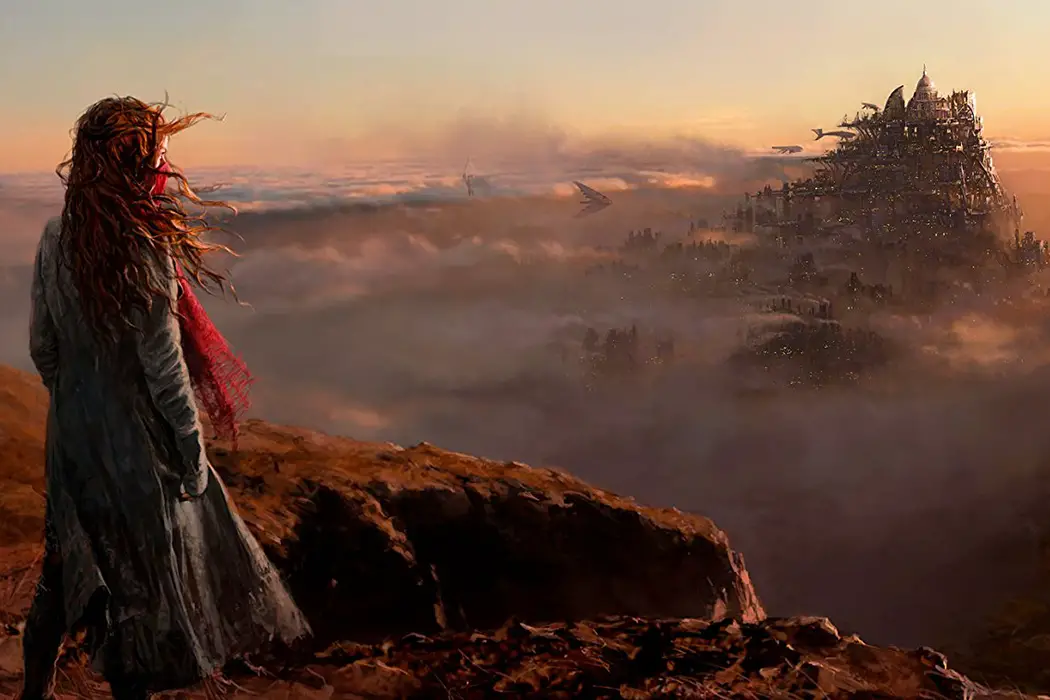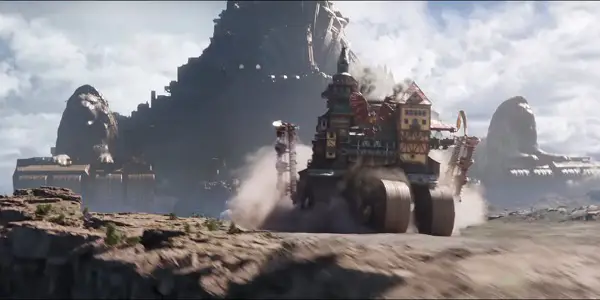MORTAL ENGINES: Better Than It Could Have Been; Worse Than It Should Have Been

Tom is a recent graduate based in the UK, who…
Philip Reeve’s Mortal Engines book is a classic young adult book full of intriguing ideas and cutting social commentary (specifically the book, not the series, as Mortal Engine’s sequels lost their way very quickly). The book is seventeen years old now, making it a strange choice to adapt as the people who were young adults upon its release are adults now, and people who are young adults now have newer and flashier film franchises.
As such, Mortal Engines never works out what to be – its first act is a fantastic smorgasbord of all the themes, icons and aesthetics that made the books popular, with great characterization of the protagonist, smart worldbuilding, and impressive production quality. However, as soon as its characters hit the ground of the second act, it devolves rapidly into a generic YA story with bland characters, poorly set up motivations and plans, and a general lack of personality.
Mortal Engines is set in a post-apocalyptic world in which cities have been mobilized, turned into giant settlements on wheels that roam the ruined world and prey on smaller towns. The protagonist, played by Robert Sheehan in the film, is a resident of London who discovers the true face of a corrupt patriarch, and is forcefully exiled into the wilderness.
While it never turns into an outright bad film, it fails to deliver on the promise set up by its first act. It seems director Christian Rivers understood the book enough to set up the world, but not enough to successfully represent its characters and the themes they stood for – either that, or he felt trotting out tired YA cliches would appeal to the nebulous “audience” better.
Open As You Mean To Go On
The previous plot summary only really covers the first act of the film – after being exiled, the main character teams up with a stranger with a mysterious past (Hera Hilmar), and they go on a variety of adventures: teaming up with a resistance force, begrudgingly growing to fall for each other, and dealing with Hilmar’s troubled past. While it follows the beats of the book fairly well, it burdens them with the many trite cliches of YA fiction that even young adults hate.

Hilmar’s mysterious past, moody attitude and hidden “deformity” (a tiny scratch on her face, which leads characters to act as though she’s hideously deformed – for some reason?) make her one in a million similar protagonists – the character is indistinguishable from Olivia Cooke’s character from Ready Player One. Besides her past she isn’t given any inkling of character or personality, and there’s no substance behind her “mysterious” persona. Similarly, Sheehan goes on the briefest of character arcs near the climax of the film and has no growth or change otherwise – which is curious given that in the first act of the film he’s portrayed in a surprisingly nuanced way, with a unique perspective on the world, the past, and the characters of the story.
The other characters are the same, with no characterization, motivations, or chemistry to speak of. The villain, played by Hugo Weaving, could be the closest to an actual character throughout, although of course his greatest moments of nuance and perspective are all in the first act.
The action is a rather mixed bag – while the city chases and action setpieces are rather well choreographed and filmed, gunfights are mediocre and hand-to-hand combat is shot in a totally bewildering way. Perhaps as a result of the fact that it’s impossible to be invested in the characters, the entire climax of the film is terrifyingly dull.

However, it’s the story that really lets the the film down. The characters have no real influence on the plot until the end, as they’re constantly wandering about with no real direction. A subplot towards the middle of the film takes full focus for a good half hour until it’s suddenly resolved and, although this subplot was present in the book, it feels purely included to dig up a certain, spoilery cliche. Similarly, the rebellion the characters join seems built on a foundation of insufferable YA tropes and cliches, with a lack of camaraderie, conviction or personality making them perhaps the most boring part of the film.
While some of the offending elements were present in the book, in it they all served the story’s themes and ideas. In Mortal Engines the film, they’re just used as performative elements to signal that it’s a YA film, without intrinsically contributing anything themselves.
Finding Your Themes
While the book Mortal Engines was an exciting and imaginative dystopian thriller (before dystopian meant the bland aesthetic it does now), it worked perfectly as a metaphor for state capitalism. It does, after all, tell the story of giant city states hunting down and recycling smaller settlements – the rulers of large states order their moving economies to literally consume smaller ones with no regard for the good or longevity of the people, resulting in various economic, social and cultural crises.
The most pleasantly surprising part of Mortal Engines is that it does import insightful social commentary from the book, although it portrays the actions of its villains and the giant cities more as indicative of colonialism than capitalism. The distinctly Victorian production design and costumes all seem to defer to notions of the British Empire, perpetuated in the Victorian times, in which Britain, and its beating heart London, forged a huge empire with no regard for the people and lands they conquered.
This is exactly what happens in the introductory action scene, as a giant London with the Union Jack emblazoned on it hunts down and captures a smaller settlement. The seemingly-heroic Hugo Weaving tells the captured prisoners that they are all welcome to the city – all whilst guards seize their belongings, and their old city is demolished in the background to become part of the amorphous mass that is London. This scene in particular works as a cutting and insightful critique of the damaging effect of forced globalization and capitalist-driven colonialism.

Unfortunately, this theme is largely forgotten for the remainder of the film. While the climax of the film could be interpreted as a denouement to this idea, it seems more a side-effect of keeping the plot of the books than an intentional continuation of the theme.
The themes presented at the beginning of the film are some of the aspects parts of the film – old statues of Minions referred to as deities of “the ancient ones” (modern humans) is amusing, and mentions of the fallen civilization intercut with archaic iPhones and other technology all worked well to set up the tale as a cautionary tale of destructive technology, the “necessary” evils of capitalism and the tragic logical conclusion to British colonialism. It’s just a shame the majority of the film forgets to extrapolate on these ideas.
Mortal Engines: Conclusion
It’s a real pity that Mortal Engines wasted its potential so much, because for the half-hour of the film it far exceeded any other YA film in terms of skilled storytelling and filmmaking. It was even shaping up to be one of the best fantasy films of the year – until the YA cliches got in the way and drained the reserves of personality it had.
The characters are bland, but never offensively so. The action is forgettable but, apart from a select few scenes, it’s never a total drag. The pacing is wonky, but the story is always clearly going somewhere. If it hadn’t been for the astounding introduction, the film would be okay. But because we can see what Rivers is capable of in the first act, it feels distressing that the rest of the film misses this mark so badly.
The film isn’t necessarily a bad one, and at least Mortal Engines is distinct enough in its world and message to make one of the better young adult films around. But don’t go expecting the start of a fantastic new fantasy franchise, as the only novel elements of it are what it tries to say, not what it tries to do.
Is it okay for a film aimed at young adults to try to explore large topics like capitalism and colonialism?
Mortal Engines was released on 8th December in UK and will be released on the 14th of December in the USA.
Does content like this matter to you?
Become a Member and support film journalism. Unlock access to all of Film Inquiry`s great articles. Join a community of like-minded readers who are passionate about cinema - get access to our private members Network, give back to independent filmmakers, and more.
Tom is a recent graduate based in the UK, who writes about films and games, and makes a few of his own. If he's not watching a film, playing a game or writing a script - don't worry! - he's probably just gone to make a cup of tea. He's never far from a screen.













